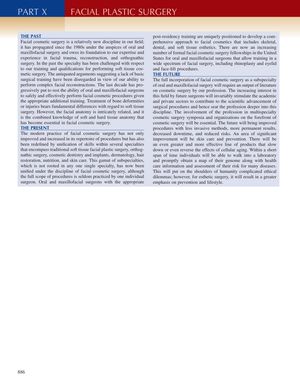Introduction
January 2012
in “
Elsevier eBooks
”

TLDR Oral and maxillofacial surgeons are now well-equipped to offer comprehensive facial cosmetic care after additional training.
Facial cosmetic surgery, which has developed since the 1980s, was initially challenged regarding the qualifications of oral and maxillofacial surgeons to perform soft tissue procedures. Over the last decade, these concerns have been largely addressed due to the surgeons' proven ability to perform complex facial reconstructions with additional training. The field has expanded to include a range of subspecialties such as orthognathic surgery, cosmetic dentistry, dermatology, and hair restoration. Although no single surgeon typically practices the full scope of facial cosmetic procedures, oral and maxillofacial surgeons with post-residency training are well-positioned to offer comprehensive facial cosmetic care. The number of formal facial cosmetic surgery fellowships in the United States is increasing, allowing for training in various procedures. The future of the field is expected to see advancements in less invasive techniques, improved skin care, and the integration of genetic information into patient care, although this will raise ethical considerations.



